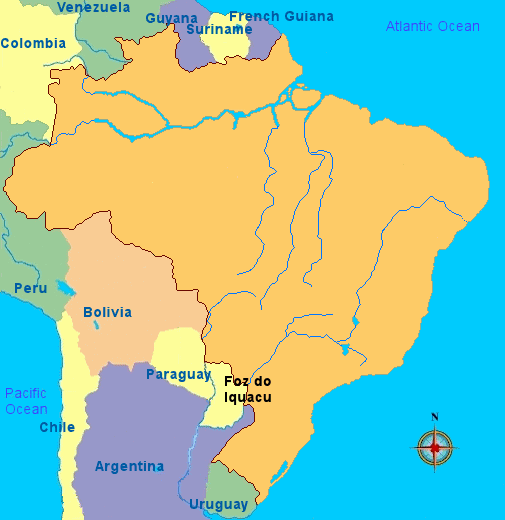Brazil

Historie
One of the earliest human remains found in the Americas, Luzia Woman, were found in the area of Pedro Leopoldo and
provide evidence of human habitation going back at least 11.000 years.
The earliest pottery ever found in the Western Hemisphere was excavated in the Amazon basin of Brazil and radiocarbon dated
to 8.000 years ago (6000 BC). The pottery was found near Santarém and provides evidence that the tropical forest region
supported a complex prehistoric culture.
Around the time of the Portuguese arrival, the territory of current day Brazil had an estimated indigenous population of 7 million
people, mostly semi-nomadic who subsisted on hunting, fishing, gathering, and migrant agriculture.
Brazil was claimed for the Portuguese Empire on 22 April 1500, with the arrival of the Portuguese fleet commanded by Pedro
Álvares Cabral.
Though the first settlement was founded in 1532, colonization was effectively begun in 1534, when King Dom João III of
Portugal divided the territory into the fifteen private and autonomous Captaincy Colonies of Brazil. However, the decentralized
and unorganized tendencies of the captaincy colonies proved problematic, and in 1549 the Portuguese king restructured them into the
Governorate General of Brazil, a single and centralized Portuguese colony in South America.
By the mid-16th century, cane sugar had become Brazil's most important exportation product and slaves purchased in the slave market of
Western Africa, had become its largest import, to cope with plantations of sugarcane, due to increasing international demand for
Brazilian sugar.
By the end of the 17th century, sugarcane exports began to decline and the discovery of gold in the 1690s would become the new backbone
of the colony's economy, fostering a Brazilian Gold Rush, attracting thousands of new settlers to Brazil.
In late 1807, Spanish and Napoleonic forces threatened the security of continental Portugal, causing Prince Regent João, in
the name of Queen Maria I, to move the royal court from Lisbon to Brazil.
With the end of the Peninsular War in 1814, the courts of Europe demanded that Queen Maria I and Prince Regent João return to
Portugal, deeming it unfit for the head of an ancient European monarchy to reside in a colony.
The Brazilian War of Independence lasted from February 1822 to November 1823 resulting in the foundation of the Empire of
Brazil (1822–1889). Dom Pedro II rulered the empire for over 58 years.
On November 15, 1889 Marshal Deodoro da Fonseca deposed Emperor Dom Pedro II, declared Brazil a republic wich ended in 1930 with
a military coup that installed Getúlio Vargas as dictator.
The period between 1946 and 1964 in Brazilian history is known as the Second Republic and was marked by political instability.
An authoritarian military junta came to power in 1964 and ruled until 1985, after which civilian governance resumed.
Brazil's current constitution, formulated in 1988, defines it as a federal republic.
Fernando Henrique Cardoso, minister of Finance from May 1993 to April 1994, won the presidency in 1994 and again in 1998. The
peaceful transition of power from Fernando Henrique Cardoso to his main opposition leader, Luís Inácio Lula da Silva, who was
elected in 2002 and re-elected in 2006, proved that Brazil had finally succeeded in achieving its long-sought political stability
I visited Brazil in november 2005.
It was part off my 24 days trip to Patagonie.
These are the places i have seen
Foz do Iguaçu
Please let me know when you're having questions.
i would be pleased to help you.
Things to do and other tips
